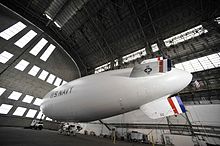The American Blimp MZ-3A is a blimp owned by the United States Navy from 2006 to 2017. It is a modified American Blimp Corporation A-170 series commercial blimp and given the USN type/model/series (T/M/S) designation MZ-3A and Bureau Number (BuNo) 167811. After delivery to the Navy, the airship began operations as an advanced flying laboratory used to evaluate affordable sensor payloads, the development of new lighter-than-air (LTA) technologies and general flight support for other related research and development/science and technology (R&D/S&T) projects. As of 2023, it was the last airship to be operated by the U. S. military. The airship now occasionally can be spotted around Boston, sporting a Dick's Sporting Goods livery.
 The MZ-3A at NAS Patuxent River in November 2013
| |
| History | |
|---|---|
| Name | MZ-3A |
| Builder | American Blimp Corporation |
| Acquired | 2005 |
| In service | 2006 |
| Out of service | 2017 |
| General characteristics | |
| Type | A-170G Non-Rigid Airship |
| Displacement | 170,000 cubic feet (4,800 m3) |
| Length | 178 ft (54 m) |
| Propulsion | 2 × 180 hp (130 kW) Lycoming IO-360 |
| Speed | 45 knots (83 km/h) |
| Range | >350 NM |
| Complement | 1 Pilot, 9 Passengers |
| Sensors and processing systems | Various C4ISR |
| Notes |
|


Description
editThe airship is propeller-driven by two 180 hp (130 kW) Lycoming engines, providing a maximum cruise speed of just under 50 kn (93 km/h). The crewed 178-foot LTA craft has an operational payload capability of up to 2,500 lb (1,100 kg) and can remain aloft and nearly stationary for more than twelve hours, performing various missions in support of technology development for Command, Control, Communications, Computers, Intelligence, Surveillance and Reconnaissance (C4ISR) concepts.
History
editIn May 2006, Air Test and Evaluation Squadron TWENTY, Lighter-than-Air Vehicle (LTAV) Detachment (VX-20 LTAV Det) began regular flight operations from Naval Air Engineering Station Lakehurst located in Lakehurst, New Jersey. In 2007 flight operations were halted and the ship stored in Hangar Six at NAES Lakehurst.
In October 2009, the MZ-3A was transferred to the United States Naval Research Laboratory Military Support Division's Scientific Development Squadron One (VXS-1), formerly known as the Flight Support Detachment, located at Naval Air Station Patuxent River, Maryland.[1][2][3]
The airship resumed flight operations in March, 2010 with test flights at Marine Corps Air Station Yuma, Arizona.
The MZ-3A was a government owned / contractor operated (GOCO) airship operated by a civilian contractor, Integrated Systems Solutions, Inc. (ISSI) of California. ISSI maintained and operated the blimp employing Navy approved, highly qualified, commercial blimp pilots to command the airship.
On 5 July 2010, the MZ-3A was re-deployed to the Jack Edwards National Airport in Gulf Shores, Alabama to assist in the Deepwater Horizon oil spill recovery operation.[4]
At a ribbon-cutting ceremony on 26 October 2011 at the Naval Air Warfare Center Aircraft Division, NAES Lakehurst, New Jersey, and in recognition of the Centennial of Naval Aviation, the Navy unveiled a fresh identity for the MZ-3A. Emblazoned with red, white and blue striped rudders reminiscent of the Navy's airships just prior to World War II, the airship also carries the insignia of the VXS-1 Warlocks and the banner of the U.S. Navy.[5][6]
In February 2012, four months after its formal acceptance by the Navy, the MZ-3A airship was at Joint Base McGuire-Dix-Lakehurst, New Jersey. It was planned to be deflated and stored, and the program suspended until future missions warranted its re-activation.[7]
In March 2012, days after the decision to suspend, the program got a reprieve for at least another 3–6 months of operations.[8] The MZ-3A was still in operation as of March 2013, providing C4ISR capabilities demonstrations in Florida for U.S. Naval Forces Southern Command/U.S. 4th Fleet.[9][10]
In October 2017, the Navy sold the MZ-3A to the Florida-based AirSign Airship Group.[11]
See also
editNotes
edit- ^ "Centennial," Spring 2010, Naval Air Forces Official Publication Vol. 2, Issue 2
- ^ "Announcement". Spot.colorado.edu. Retrieved 28 March 2013.
- ^ "Naval Air Station Patuxent River Base Guide". DCMilitary.com. Archived from the original on 29 July 2012. Retrieved 13 July 2010.
- ^ "100704-N-0000H-001". Cgvi.uscg.mil. Archived from the original on 15 July 2012. Retrieved 13 July 2010.
- ^ "152-11r". United States Navy. Archived from the original on 1 November 2011. Retrieved 27 October 2011.
- ^ "Navy Airship Gets New Colors". Baynet.com. Archived from the original on 2 June 2012. Retrieved 18 November 2011.
- ^ "Navy will mothball revived airship program". Navy Times. Retrieved 22 February 2012.
- ^ "MZ-3A Airship Gets Reprieve". blimpinfo.com. Retrieved 14 March 2012.
- ^ Mass Communication Specialist 1st Class Sean Allen, 4th Fleet Public Affairs (22 March 2013). "Navy Airship Visits 4th Fleet, Naval Station Mayport". United States Navy. Retrieved 28 March 2013.
{{cite news}}: CS1 maint: numeric names: authors list (link) - ^ Henderson, Adam, MC2 (26 March 2013). "U.S. Navy photo 130326-N-WA189-002". United States Navy. Archived from the original on 4 March 2016. Retrieved 28 March 2013.
{{cite web}}: CS1 maint: multiple names: authors list (link) CS1 maint: numeric names: authors list (link) - ^ "Acquisition Positions AirSign as World Leader in the Airship Industry". blimpinfo.com. Retrieved 10 August 2023.
References
edit- Navy Lakehurst Historical Society, "The Airship," April–May 2007, "Navy LATV Unit Honors NLHS, pg 5
- Naval Airship Association, "The Noon Balloon" Summer 2006, "After 44 Years, Lakehurst Back in Lighter-Than-Air Flight Research," posted by the Asbury Park Press, 5 September 2006, by Kirt More, Toms River Bureau, pgs 8–10.